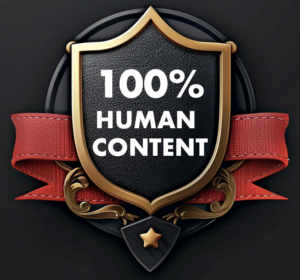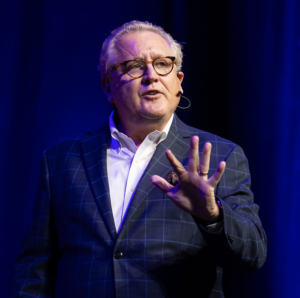
A LinkedIn comment made me wonder about the practical economic value of human authenticity and the “soul” in our work. Does that seem heretical? Let’s dive in and see …
To set the stage, Andrew Safnauer read my post about how AI is taking the soul out of music, marketing, and most creative endeavors. Most people responded with a virtual high-five to the idea that we will always seek out true human connection. This has been my position, too. Then I read Andrew’s comment (edited for style):
“I worked in radio for my first career. Post deregulation in late 1990s, the industry eliminated overnight DJs through automation. (Saved money). Worked so ‘well’ that they moved it to other time slots. Slowly but surely local talent was replaced by someone from out of town or, more often, no one — they just let the music play.
“The technology removed the unique advantage of radio — the local touch, a connection to the community. And frankly, they removed the soul of what a local radio station brought to a town.
“You can buy a decent frozen pizza made by a machine but it is never going to be as good as one made at Sal’s Pizza by a guy who’s worked the oven for 30 years. His work has soul.”
Let’s dissect this observation. There is an unexpected truth here.
The economics of human authenticity
Andrew’s comment has two nuanced, important points:
- The radio industry, built on the popularity of human DJs, eliminated them—literally cutting the soul out of the product. And it didn’t matter. Radio stations moved on with a new economic model nearly devoid of human authenticity.
- However, the beloved local pizza baker can only survive in a world of big chain competition due to the local, human connection.
This got me thinking. Despite our human marketing pride, the authentic human element doesn’t always win. Businesses will use AI to cut the heart out of our work to save money, and in some cases, customers won’t care. This might seem unfair, but as much as we decry the soul-less AI bots, they’re coming, and they’re winning.
The other point is that soul does matter … sometimes. Why is human authenticity critical for a local pizza guy and not the popular DJ?
When I was a kid, the local DJs were GODS. They were your only connection to music discovery in those pre-Spotify days. I would argue their role and presence in a community was at least as important as the pizza maker. What’s the difference and what went wrong?
Authenticity isn’t dead. It’s just … complicated.
But I think I know how to unravel this.
The jobs to be done
 On this blog and in my podcast, I’ve covered an idea called “jobs to be done,” attributed to Clayton Christensen.
On this blog and in my podcast, I’ve covered an idea called “jobs to be done,” attributed to Clayton Christensen.
The simple idea is that people don’t necessarily buy a product. They buy a job to be done. People don’t need a drill. They need a hole.
One way to figure out the economics of human authenticity in an AI world is to evaluate this through the lens of jobs to be done.
When I have a problem with an appliance, I call a customer service rep to get it repaired as fast as possible. The job I need is to fix this thing fast. I don’t care if the rep on the other end is a human who writes poetry and cares for her elderly goldfish. I just want to get off the phone, and if an AI bot can do it better, that would be great!
In this case, the economic value of human authenticity based on the “job to be done” is zero.
When I was a kid, the job I hired a radio DJ for was to:
- Play my favorite songs
- Answer the telephone request line to play my favorite songs
- Help me find more favorite songs.
They were the gatekeepers of cool, but really … it was about the songs. They became dispensable because the job to be done is easily automated. I liked these personalities and enjoyed their jokes, so the economic value of human authenticity would not be zero, but it was low enough that I don’t lay awake at night grieving the loss of DJs. I happily accept the convenience of Spotify.
Sometimes, the robot wins.
AI and your economic value
By comparison, let’s examine the jobs we might hire the local pizza chef to do:
- Remind us of the good times we have at this restaurant
- Create a special dinner just the way we like it
- Watch a sporting event in a place that is nostalgic and filled with fellow fans
- To see the friendly face of the owner
- Enjoy something made with unique craftsmanship, maybe an old family recipe with that special sauce!
None of this can be automated. The human connection is everything. Maybe their pizza costs a little more. Maybe the restaurant floor is a little grimy. Maybe we drive an extra mile to get there. But we don’t care because only this human being can deliver these “jobs to be done.”
In this context, we can evaluate the economics of human authenticity for our own careers. What job are people hiring you to do?
Copywriting? Basic illustrations? Editing? Yikes. You’re in DJ territory.
What is uniquely yours? What is your special sauce or unique “family recipe” that you bring to the marketplace?
This is why I’ve been yelling from the rooftops for years — a strong personal brand is our only defense against the encroachment of AI. You need to deliver something that is uniquely you. What’s the problem you solve in a way that cannot be ignored?
Start now.
I am not a salesy person. This is not a salesy blog. But I do have a solution if you’re feeling vulnerable in this Ai turmoil.
For more than five years, I’ve been teaching a personal branding class that is the best of its kind. It’s taught live. It’s based on experience, research, and best practices. And it has absolutely changed lives.
It’s not too late to start working on your personal brand and focus on your unique value. Please consider my class, which can be found here.
In the end, it’s not about being human everywhere. It’s about being human where it matters most.
 Need a keynote speaker? Mark Schaefer is the most trusted voice in marketing. Your conference guests will buzz about his insights long after your event! Mark is the author of some of the world’s bestselling marketing books, a college educator, and an advisor to many of the world’s largest brands. Contact Mark to have him bring a fun, meaningful, and memorable presentation to your company event or conference.
Need a keynote speaker? Mark Schaefer is the most trusted voice in marketing. Your conference guests will buzz about his insights long after your event! Mark is the author of some of the world’s bestselling marketing books, a college educator, and an advisor to many of the world’s largest brands. Contact Mark to have him bring a fun, meaningful, and memorable presentation to your company event or conference.


